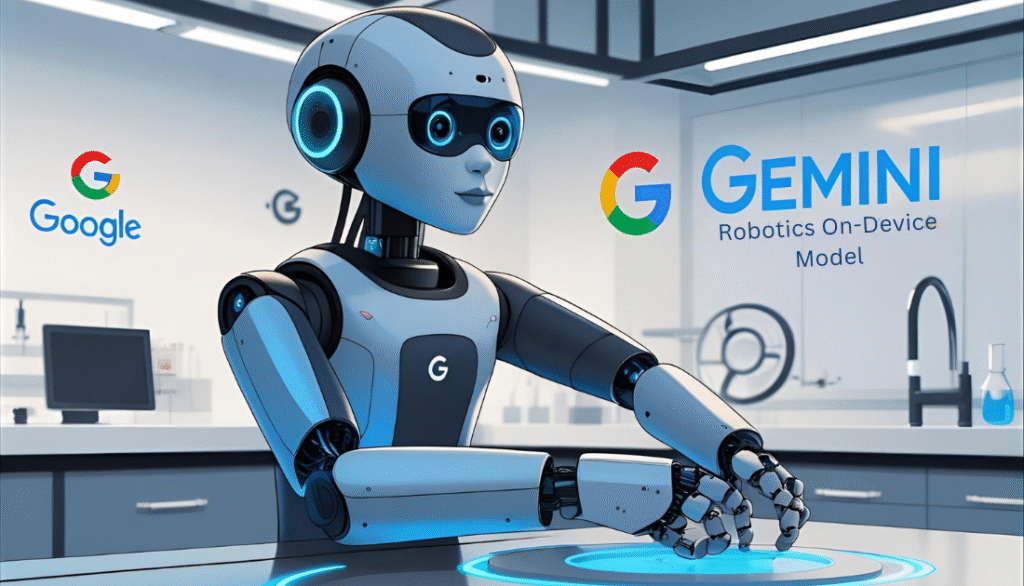Google DeepMind has released Gemini Robotics On-Device, a new iteration of its robotics language model that can operate without internet connectivity.
HIghlights
- Offline-Capable AI: Gemini Robotics On-Device runs locally on robots, enabling functionality in low or no connectivity environments—ideal for manufacturing, logistics, and home automation.
- Cloud-Like Performance: Despite being offline, the model reportedly matches cloud-based versions in accuracy and task execution across real-world benchmarks.
- Live Demo Success: Robots powered by Gemini On-Device performed complex tasks like unzipping bags and folding clothes with high motor precision and contextual understanding.
- Cross-Platform Adaptability: Gemini was deployed on third-party hardware such as Franka FR3 and Apptronik’s Apollo, even executing unseen tasks with minimal training.
- Developer-Friendly SDK: The Gemini Robotics SDK allows fine-tuning with just 50–100 visual demos using MuJoCo, drastically lowering barriers for smaller dev teams and researchers.
- Secure + Private: The offline design supports sensitive environments, such as secure facilities or remote industrial sites, where cloud access may not be permitted.
- Part of a Growing Trend: Google joins companies like Nvidia and Hugging Face in pushing localized AI for robotics, focusing on real-world adaptability and efficiency.
This advancement marks a significant step in making robots more autonomous, efficient, and suitable for deployment in environments with limited or no network access.
From Cloud to Local
Previously, Google’s Gemini Robotics system—introduced in March—relied on cloud-based processing. The new on-device version shifts the computational load directly onto the robot, minimizing latency and enhancing reliability.
This evolution is particularly useful in industries like manufacturing, logistics, and home automation, where constant internet access may not be guaranteed.
According to Google, the on-device model delivers performance comparable to its cloud-powered predecessor, and in internal benchmarks, it reportedly outperformed other unnamed on-device models in task evaluations.
While full benchmark details remain undisclosed, the company emphasizes the model’s ability to manage complex physical manipulation tasks with high accuracy.
Demonstrated Capabilities and Platform Flexibility
During a live demonstration, robots running the new Gemini model successfully completed nuanced tasks such as unzipping bags and folding clothes, showcasing not only motor precision but also contextual understanding.
Originally developed for Google’s ALOHA robots, the model was also adapted to third-party systems like the Franka FR3 dual-arm robot and Apptronik’s Apollo humanoid.
Notably, the Franka FR3 performed unseen tasks, including belt assembly, without specific training—highlighting the model’s generalization capability and adaptability across different hardware platforms.
Gemini Robotics SDK
To encourage broader adoption, Google DeepMind is releasing the Gemini Robotics SDK. This toolkit enables developers to fine-tune the model using as few as 50–100 visual demonstrations, thanks to integration with the MuJoCo physics simulator.
This approach significantly lowers the barrier for entry into robotics development, making it feasible for smaller teams or academic researchers to create custom robotic workflows without extensive datasets.
Offline and Secure Operations
Carolina Parada, Google’s Head of Robotics, highlighted that while the cloud-based Gemini remains more powerful overall, the on-device version offers strong performance in low-connectivity or high-security environments.
This opens new opportunities for deploying AI-powered robots in remote areas, industrial settings, or facilities with strict data privacy requirements, where cloud reliance may not be viable.
Localized AI in Robotics
Google’s move aligns with a growing industry trend toward localized AI models in robotics. Companies like Nvidia, Hugging Face, and RLWRLD are also developing foundation models for general-purpose robotic systems.
However, Google’s focus on real-world adaptability, data efficiency, and seamless cross-platform deployment positions Gemini as a notable contender in this rapidly evolving space.


